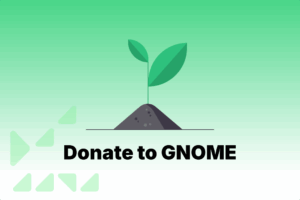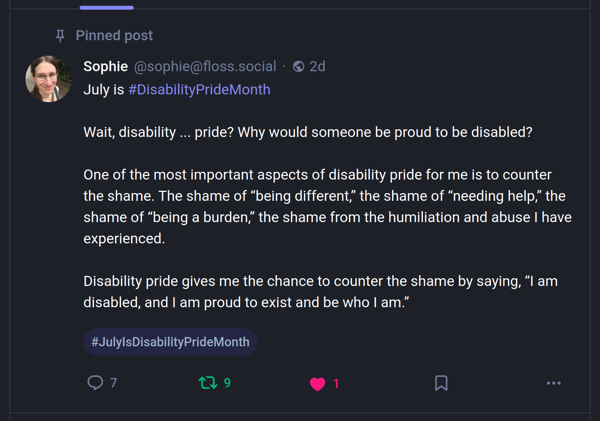As the board announced earlier today, I will be stepping down from the Executive Director role this week. It’s been an interesting four months. If you haven’t been following my work with the Foundation during that period, you can peruse the weekly Foundation Reports starting from May 3rd. You can also hear me in a few places at GUADEC 2025: the Day 1 Panel Discussion (where I was extremely sick), my Day 3 keynote, and the AGM from Day 3.
As Allan mentions in his post, he’s taken over the role of board President. This means he will also be taking over as acting Executive Director when I step down, as per GNOME Foundation bylaws, and picking up where I left off. I’m enthusiastic about this transition. I have enjoyed working closely with Allan over the past four months and, with him at the helm, my only disappointment is that I won’t get to continue working closely with him.
It’s not only Allan, of course. In a few short months I’ve found it remarkable how hardworking the entire GNOME community is. You folks accomplish so much in such short spans of time, with limited resources. But even more surprising to me was just how warm and welcoming all the contributors are. A lot of folks have built a real home here: not just a professional network, but an international village. Language, cultural, and economic barriers are broken down to make GNOME such an inviting project and I’m honoured to have served GNOME as ED, even if only for a brief period.
With that in mind, I would like to thank a number of hackers I’ve had the good fortune of speaking to over the past four months.
First, those folks with non-development roles. Maria, Pietro, and other volunteer conference organizers. The unnamed contractors who balance the Foundation’s books, clear invoices, provide legal advice, consult, and run trainings. Karen, Deb, Loren, Amy, Stefano, Sumana, Michael D, and others who are long-time GNOME supporters and mentors. Andrea, who still contributes an inordinate amount of volunteer time to GNOME infrastructure and the elections process. Emmanuele, Alice, Michael C, Jordan, Chris, Brage, Sri, and others who quietly moderate GNOME’s social spaces to keep them safe. GNOME owes a great deal to all these folks. Their contributions largely go unnoticed. Everything that just magically works? That’s because someone is putting in a lot of time and effort to keep it that way.
Second, the Design Team. I’ve had so many wonderful interactions with Jakub, Allan, Tobias, Sam H, Jamie, and Kramo that I’ve lost count. I’m in awe of how quickly you folks work and I’m grateful for every opportunity I’ve had to work with you, big or small. Jamie and Kramo, for your help outside the Design Team, in particular: thank you for keeping me honest, calling me out on my shit, and never giving up on me even if I say or do something stupid. 🙂 It means a lot.
Thank you to GNOME’s partners, Advisory Board reps, and other folks who the community may not see on a regular basis. Jehan, thank you for everything you do for GIMP. Scott, it was a pleasure meeting you at GUADEC and learning more about SUSE! Jef, thank you for your continued advice and guidance. Jeremy and Michael: I really enjoyed our AdBoard day and I hope GNOME gets even more vertically integrated with upstreams like Debian and LibreOffice. Aaron, Mauro, Marco, and Jon: I’m optimistic you folks can bring Ubuntu development and core GNOME development closer together, and I’m grateful for all the time you’ve given me toward that goal. Matt, Alejandro, and Ousama: I genuinely believe the way the Linux desktop wins is by shipping pre-installed to your customers at Framework and Slimbook. Mirko and Tara: as a user, I’m grateful for STF continuing to finance the underpinnings of GNOME’s infrastructure, and I look forward to seeing what else STA can do. Aleix, Joseph, and Paul: KDE is lucky to have you folks and GNOME is lucky to have you as friends. Paul especially, thank you for all your fundraising advice based on your experience with KDE’s campaigns. Robin, Thib, and Jim, thank you for giving us a federated Slack alternative! I feel many people don’t appreciate how relentless you are in improving your product. Mila, Spot, Henri, Hannah, Chad, Rin, Esra’a, and others: thanks for being on our team, even if you work for proprietary software companies. 😉
And, of course, the text hackers. Thanks to Alice, Jordan, Emmanuele, Martin, Neils, Adrian, Jeff, Alexandre, Georges, Hari Rana, Ignacy, Mazhar, Aaditya, Adrien, swick, Florian, Sophie, Aryan, Matthias C, Matthias K, Pablo, Philip W, Philip C, Dan, Cassidy, Julian, Federico, Carlos, Felix, Adam, Pan, Kolja, and so many others for your conversations not just about GNOME development but the entire process and ecosystem around it. My conversations with you guided my entire time as ED and I hope you continue to provide the board with the same strong feedback you’ve given me. Joseph G and Andy, I’m sorry we never managed to sync up!
Last but not least, I’d like to thank the previous EDs over the past four years. Holly and Richard both had incredibly difficult situations to deal with. Richard, I’m very lucky to have met you in person and to get a real hug from you in June when I was struggling. I’ve said it before, but GNOME (and the board, in particular) is extremely lucky to have you as a friend and advisor.
I have undoubtedly forgotten people. Thankfully, you can complain to me directly. 😉 If you like the work I’ve done at the Foundation, you can also speak to me about other roles in the space. I would love to continue working within the wider Free Software ecosystem and especially on the Linux desktop.
I will be fully off-grid for two weeks mid-September so I can meditate a 10-Day “self course.” (Our proper 10-Day Vipassana course was cancelled due to the ongoing Nova Scotia wildfires.) But I’m back to the real world after that.
I’ll be around on Matrix and Discourse as a GNOME Foundation Member. I’m on Mastodon. I have another blog. My name was a Googlewhack once. You can also reach me using the standard flastname@gnome.org email format. You can find me. My door is always open.

